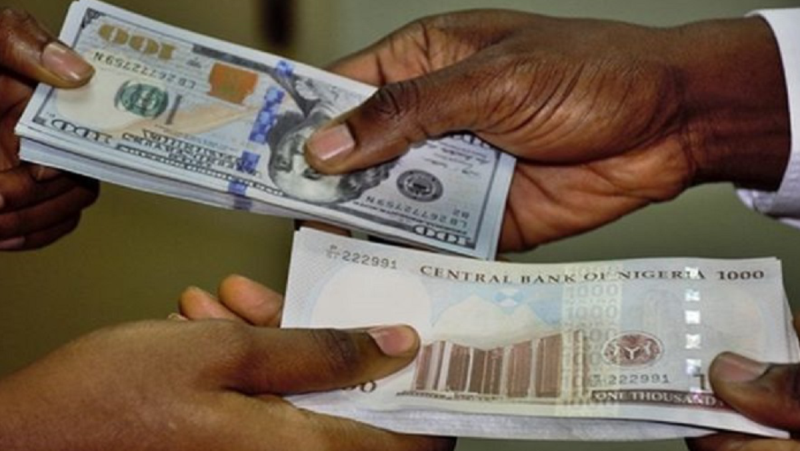THE Naira on Wednesday, August 23, closed at N900/$ at the parallel market, N70 weaker than N830/$ this week’s opening.
The local currency, which regained steam after the acting governor of the Central Bank of Nigeria (CBN), Folashodun Shonubi, threatened forex speculators of losing huge amount, relapsed as the speculators sustained their operations.
At the Investor and Exporter (I&E) window, the official market, the naira closed at N773.42 to dollar, creating around N123 premium between the official and parallel markets.
There was $61 million turnover at the I&E window.
One of the forex traders based in Abuja, Mustapha Bakori said he was not surprised to see the naira depreciate, because initial expectation of improved dollar liquidity in the market, was not met with action.
He said: “Many people expected immediate intervention in the market that will boost dollar liquidity, but that is taking too long to happen. Until that is done, the naira will continue to come under pressure,” he said.
A Bureaux De Change (BDC) trader based in Marina, central Lagos, Garuba Sarki, said many forex dealers are still not sure, where the rtes will oscillate in the next few weeks, because the Central Bank of Nigeria (CBN) is still keeping the market in suspense.
He said: “Many speculative dealers were taking the back seat have returned to the trenches. We expect the naira to continue to depreciate until the policy environment is well defined,” he said.
Also speaking, the president, Association of Bureaux De Change Operators of Nigeria (ABCON), Dr. Aminu Gwadabe, advised the Federal Government to enhance financial intelligence by tracking people with proceeds of corruption to sanitize the market.
He said many of the people with proceeds from corruption are the ones putting pressure on the forex market through their manipulative actions.
“The naira is depreciating not by forces of demand and supply, but by the collective action and impact of the people with illicit funds,” he said.
The CBN had in June commenced currency reforms that brought about exchange rate unification and abolishment of multiple multiple exchange rates.
The exercise led to 40 per cent drop in naira rate at the official market, but dollar supply has continued to be a big challenge making it difficult for official and parallel market rates to converge.
Former Executive Director, Keystone Bank Limited, Richard Obire said the weakness of the naira over time has been caused by two broad issues linked to the quality of leadership and governance.
He said Nigeria’s heavy and skewed outward-oriented consumption of goods and services as seen in decades of long substantial bills for food and energy imports remains a hindrance to naira stability.
Also, the massive corruption-driven capital outflows which in turn severely damages Nigeria’s capacity to produce at scale that will enable the country to fully engage its large population to create widespread prosperity works against the naira.
On ways to strengthen the naira, he advised that in the short-term, there is need to find non-market damaging ways to increase the supply of hard currencies and reducing the demand for same.
“Our crude oil export quota is currently 1.74 million barrels per day. In July, we produced 1.081m bpd. Let us get our production up to the full quota. At current market price of about $87 per barrel, this should see us earning an additional about $1.7 billion per month. Nigerian Diaspora Remittances rather than declining should be growing as the population of our Diasporans are growing. Half year January to June 2023, remittances totaled $952 million compared to $1.21 billion for the same period in 2022,” he said.
According to Obire, right pricing for remittances and frictionless processes for their use by recipients should see the volumes growing again.
He said that insecurity hampering food production needs to be tackled with a sense of urgency and effectiveness.
“Priority should be given through deploying pragmatic incentive programs to drive up the volume of food products for domestic consumption and industrial use to reduce our food import bill. All government consumption expenditures requiring the use of hard currencies should be suspended indefinitely, starting now,” he advised.
Continuing, Obire said the Turn Around Maintenance (TAM) status of refineries in Port Harcourt and Warri should be appraised immediately. Effort should be focused on the one which can begin producing quicker. The other one should be made to be up and running, not long after. This should reduce required forex for fuel imports.
He noted: “In the long term, only a strong economy will produce a stable currency. To achieve this will require addressing the fundamental structural defects in our political-economy hampering an accelerated transition from an outward consumption oriented economy into a mainly balanced production driven one. “



